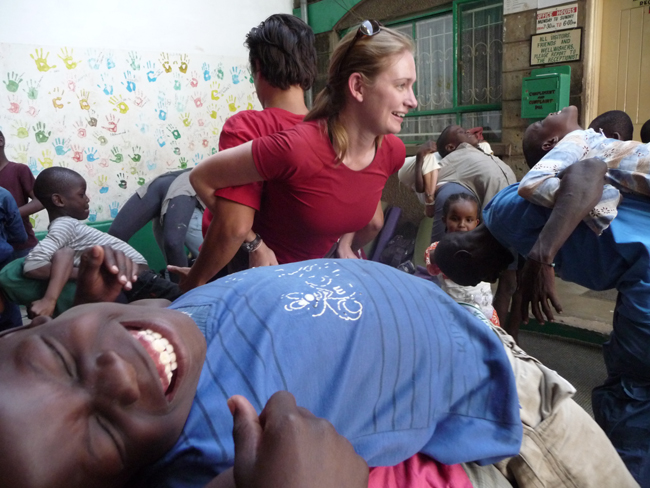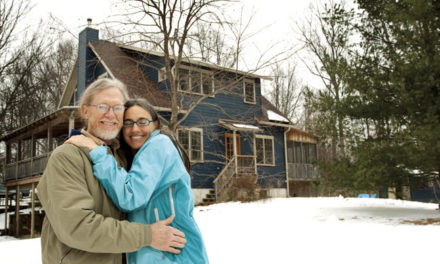BY ELISABETH ANDREWS
When Meghann Beer, a nonprofit consultant and yoga instructor, first started planning a service trip from Bloomington to Nairobi, Kenya, she sought advice from other nonprofits that had organized international group projects. At the top of her list of contacts was Jon Racek, director of Playground Ideas, an organization that builds playgrounds in impoverished communities around the world. Beer was unsure where Playground Ideas was headquartered, so when she sent Racek an email she expected to set up a phone call or video-chat session. Instead, she received an immediate response: “Great, let’s meet for coffee!”
“I had no idea he was in Bloomington,” she says. Beer works with Africa Yoga Project (AYP), an organization headquartered in New York state that trains and supports yoga teachers in East Africa. This year she coordinated its Seva Safari program that organized two community-service projects bringing volunteers to Kibera, Nairobi’s largest slum. The spring trip was a collaboration with Playground Ideas to build a rooftop playground in Kibera.
“It was a really great fit to bring these two Bloomington-based programs together in Kenya,” she says. “We had similar ideas about giving kids a safe space where they can have fun and laugh.”
Music education, too
The Bloomington-Kenya connection runs deep, in fact, encompassing not only IU programs through the School of Medicine and School of Public and Environmental Affairs but also independent, community-based partnerships. In addition to Playground Ideas and the Seva Safari program, local music-education organization Mpingo Studios recently returned from a service-oriented trip to Nairobi. Like Beer and Racek, Mpingo’s director, Diana Smith Nixon, also approaches humanitarian work not as a process of delivering aid but rather as one of intercultural, interpersonal engagement.
“Our objective is to perform, connect with other musicians, support those musicians, and collect repertoire,” she says. “It’s not a mission trip; it’s a cultural exchange.”
Nixon, a professor at Ivy Tech Community College, completed a two-week residency in Nairobi in April 2012, along with Kimberly Carballo, a coordinating opera coach at IU’s Jacobs School of Music, and Nixon’s daughter, Liz, then a freshman at the IU music school. During their visit, they held music classes for more than 200 students ranging from primary-school children to young adults enrolled in college. They also held concerts, attended performances by children’s groups and the renowned Kenya Administration Police Band, and brought home Kenyan musical repertoire to share with Bloomington students, musicians, and listeners. The connections forged during the trip continue through ongoing video-chat sessions with Kenyan students.
A path to employment
The AYP-Playground Ideas trip left a similarly lasting impact, with the playground project not only providing a recreational space that Beer calls “an oasis in Kibera,” but also enriching Kenyan volunteers with the skills to build more such structures.
“The training that we do with local communities often becomes a path to employment,” says Racek, an architect who also teaches interior design at IU. He explains that Playground Ideas relies on locally available, inexpensive materials like used tires, so the projects can be realistically replicated.
This idea of creating jobs that don’t deplete resources is also a central focus within AYP. Because yoga requires only one’s body, teachers trained through AYP are able to make a living without incurring startup expenses. “These teachers are now income-generating and able to support their families,” Beer says.
For each of the three organizations, connecting with Kenyan communities goes beyond addressing the immediate needs normally associated with international aid work. Beer admits that she has encountered critics who believe that volunteers in East Africa should focus exclusively on relief issues like hunger and health care. However, from her perspective—and that of Racek and Nixon—the resilience of the human spirit is a primary concern.
“Our goal is to give people a sense of hope and enable them to feel empowered to make a change in their lives,” she says. “We’re focusing on human capital.”

















I live i bloomington would love to connect with this group visiting Kenya
Great job Ms Beer. Thanks for your contribution to making this world a happier place.